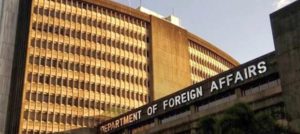An agreement marking the boundary between the overlapping exclusive economic zones (EEZs) of the Philippines and Indonesia officially entered into force following the exchange by the two countries’ foreign ministers of the instruments of ratification in a ceremony held on Thursday in Bangkok, Thailand.
Foreign Secretary Teodoro Locsin Jr. and Indonesian Foreign Minister Retno Marsudi signed the protocols of exchange of the instruments of ratification concerning the delimitation of the EEZ between the two countries.
Common interest
The signing ceremony took place on the sidelines of the Southwest Pacific Dialogue during the ongoing 52nd Association of Southeast Asian Nations (Asean) Foreign Ministers Meeting.
In a statement titled “Treaty Setting PH, Indonesia EEZ Boundary Enters into Force,” the Department of Foreign Affairs (DFA) said: “The agreement is expected to benefit both countries, economically and politically, by promoting more bilateral cooperation in the EEZ in order to advance the common interest of managing and preserving the resources in the EEZ and further strengthening maritime security cooperation between the two countries.”
Sovereign rights
The statement further pointed out that “[t]he Philippines and Indonesia, the two largest archipelagic states in the world, are parties to the 1982 United Nations Convention on the Law of the Sea (Unclos), and thus are entitled to EEZ of 200 nautical miles [370 kilometers]. Under the convention, states have sovereign rights to explore and exploit, and conserve and manage natural resources, among others, within their EEZ.”
“Wide overlaps in the EEZ of the Philippines and Indonesia, which run across the Mindanao Sea and Celebes Sea, and in the southern section of the Philippine Sea in the Pacific Ocean, required the two countries to negotiate and agree on a shared boundary,” the DFA said.
The Philippines, on its western side, has a continuing maritime dispute with China over the latter’s occupation of the Philippines’ EEZ. The dispute remains unresolved even after a 2016 ruling by the Permanent Court of Arbitration in the Philippines’ favor.
First tackled in 1994
According to the DFA, the agreement was first discussed in 1994 and was formally signed by the two countries in Manila 20 years later, during the visit of then Indonesian President Susilo Bambang Yudhoyono.
The agreement was ratified by President Duterte on Feb. 15, 2017 and by the Indonesian Parliament on April 27 that year.
The Senate then concurred with the President’s ratification through a resolution on June 3 this year. —JEROME ANING


